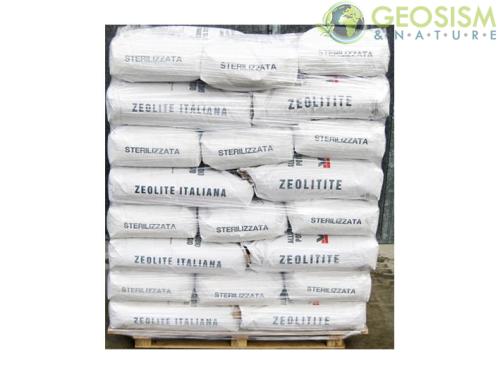Zeolite based on Chabasite and Phillipsite 0.01 / 0.1 mm (pallet of 40 bags of 25 kg), soil improver for plants
ZEOLITE BASED ON CHABASITE AND PHILLIPSITE 0.01 / 0.1 mm (pallet of 40 bags of 25 kg), FINE FOR PLANTS.
Group of minerals consisting of 52 mineralogical species chemically defined as ?hydrated aluminosilicates of alkaline and / or alkaline-earth elements? (essentially, Na, K and Ca) and structurally constituting the family of tectosilicates with feldspar, feldspar and silica minerals. In this family of silicates, the primary structural units, tetrahedra [(Si, Al) O4], are connected to each other in the three directions of space to form three-dimensional scaffolds with a consequent ratio of tetrahedral cation (Si, Al) to oxygen of 1: 2.
Unlike what occurs in other families of silicates where the same structural units are isolated (nesosilicates, e.g. olivines), connected in one direction (inosilicates, e.g. pyroxenes) or in two directions (phyllosilcates, e.g. clay minerals ), the three-dimensional tetrahedral scaffolding of tectosilicates gives rise to ?open? structures due to the presence of extratretrahedral cavities of increasing volume from feldspar and silica minerals to feldspar to zeolites.
The three-dimensional tetrahedral scaffolding of zeolites is "very open" (low tetrahedral density) and, as such, has large internal cavities (from 20 to 50% of the volume of the crystal) communicating with each other and with the outside through channels of molecular dimensions (from 2.5 to about 7 Å; 1 Å = 10-8 cm).
In their natural state, cavities and channels are occupied by cations (Na, K, Ca) and water molecules. The cations, necessary to balance the negative electrical charges of the tetrahedral scaffold due to the partial replacement of Si4 + with Al3 +, being weakly linked to the tetrahedral scaffold, enjoy a certain freedom of movement and can exit, through the channels, from the cavities and therefore from the crystal only if replaced by other cations having the same number of positive electric charges.
This property, known as "cation exchange capacity" (CSC), has an intensity (expressed in meq / g) increasing with the increase of the Al content in the tetrahedra and varies from about 2 meq / g in the zeolites poor in Al (clinoptilolite , ferrierite mordenite) at 3-4 meq / g in zeolites rich in Al (chabasite, phillipsite).
The water, from 10 to 20% by weight depending on the zeolite species, can be easily and more or less continuously removed by heating below 300-350 ° C with no or modest modifications of the tetrahedral scaffold.
The dehydrated zeolites have a large internal surface (up to a few hundred m2 per gram of substance) available to still host water molecules or other molecules with natural or induced polarity. The dehydration-rehydration process is reversible almost indefinitely and the absorption of polar molecules occurs according to a rigid "selection" based "first and foremost" on the size of the molecules and, secondly, on their degree of polarity.
The material is sterilized in the oven up to a temperature of 200 ° C for 20 minutes, the finest and most dusty part has a high sterilizing power against fungal diseases (mold and mildew).
MEDIUM CHEMICAL ANALYSIS
Determined by Fluorescence X and Loss by Calcination
SiO2: 52.0%
Al2O3: 17.0%
K2O: 6.1%
Fe2O3: 3.6%
CaO: 5.7%
Na2O: 0.6%
TiO2: 0.5%
MgO: 2.3%
H2O (Structure lost above 120 ° C): 12.0%
MnO: 0.2%
P2O5: 0.3%
TECHNICAL FEATURES
DEFINITION: POTASSIUM SILICATE, SODIUM AND CALCIUM
Volcanic rock with high cation exchange and water absorption capacity due to the prevalent content of chabasite and phillipsite ?tectosilicate? minerals and lithological texture;
QUALI-QUANTITATIVE MINERALOGICAL COMPOSITION: (in% with standard deviations) determined by X-ray with the Rietveld-RIR method (Gualtieri, 2000): chabasite 60 ± 5; phillipsite 5 ± 3; k-feldspar 4 ± 2; biotite 2 ± 1; pyroxene 4 ± 1; volcanic glass 25 ± 5;
CONTENTS IN CABASITE [(Na0.14 K1.03Ca1.00Mg0.17) [Al3.46 Si8.53O24] 9.7 H2O] AND PHILLIPSITE: 65 ± 5%;
HEAVY ELEMENTS: quantity (ppm) released by elution according to the IRSA-CNR procedure (1985): Pb 10; As 5; Cd 2; Zn 20; Cu tr;
pH: 6.9 - 7.1
HIGH CATION EXCHANGE CAPACITY: 2.1 ± 0.1 meq / g with marked selectivity towards cations with low solvation energy (NH4, K, Pb, Ba)
HIGH STRUCTURAL CRYPTOPOROSITY: from 20 to 50% of the volume of the crystal;
REVERSIBLE DEHYDRATION: dehydration (endothermic process) - rehydration (exothermic process) infinitely reversible and therefore potential to mitigate the positive and negative peaks in the degree of humidity and environmental temperature
MOLECULAR SIEVING ;
WATER RETENTION: 30-40% (w / w) depending on the particle size;
MECHANICAL RESISTANCE ;
PERMEABILITY ;
APPARENT DENSITY: 0.70 g / cm3 - 0.90 g / cm3 depending on the particle size.
FUNCTIONAL CHARACTERISTICS AND FIELDS OF USE
Lightweight natural inert, ideal for:
? allows to reduce watering by 30-40% thanks to the characteristics described above;
? neutralizes harmful elements, ammonium, heavy metals, organic molecules;
? absorbs odorous gases, ammonia, hydrogen sulphide, mercaptans;
? improves the use of fertilizers, consequently reducing the quantities to be used;
? purification of waste water;
? rooting substrate (sowing, cuttings, transplants, soilless crops and hydroculture);
? preparation of universal molds;
? preparation of specific soils (annuals, acidophilic plants, succulents, houseplants, lawns?);
? preparation of professional soils for outdoor horticultural nurseries and protected crops;
? land amendment;
? hydroculture;
? drainage;
? animal feed, in a variable quantity between 2 and 3% (reduction of the N-ammonia content of sewage, reduction of intestinal and respiratory diseases, inhibition of the absorption by animals of afla- and mycotoxins, slight improvement of feed conversion index, reduction of NH3 content and unpleasant odors in farms and neighboring areas).
NB: AVAILABILITY OF THE MATERIAL
The material is subject to availability, it is usually taken directly from the manufacturer in the quarry and sent to the customer in order to always have a clean product in excellent condition. We therefore ask our customers to check availability and delivery times by contacting Geosism & Nature sas










